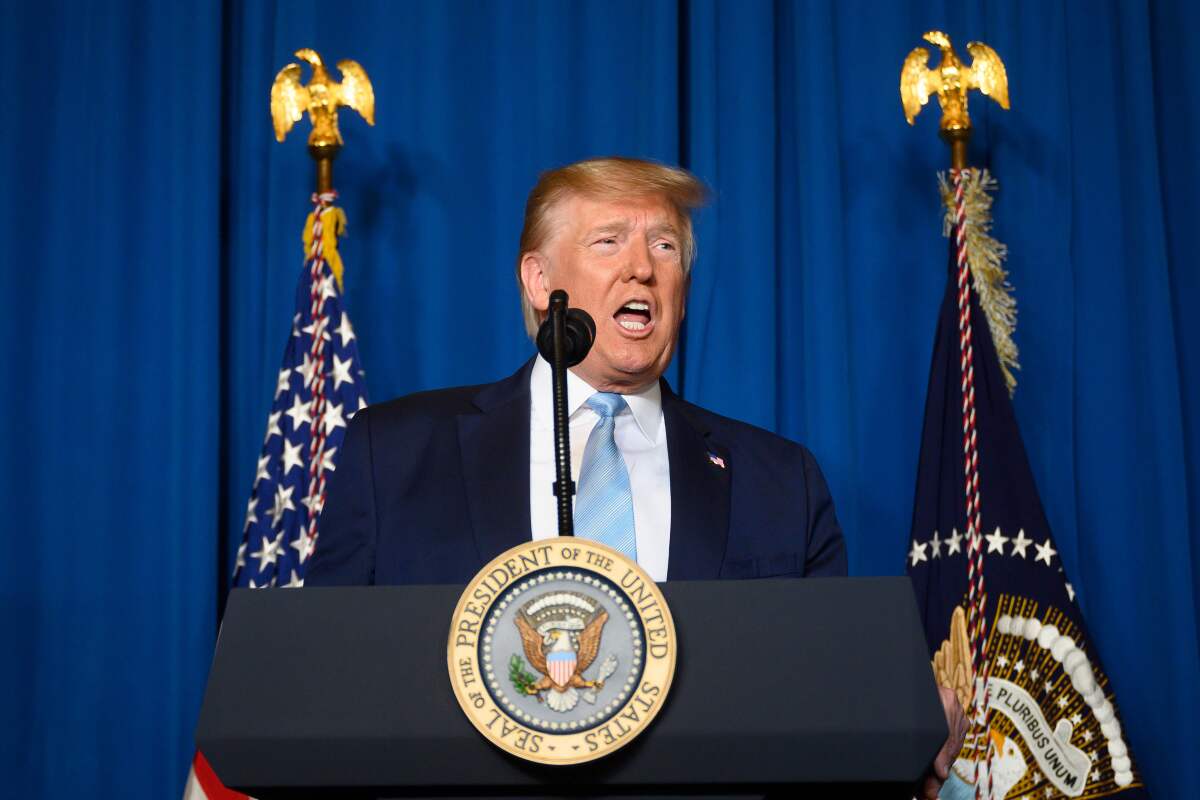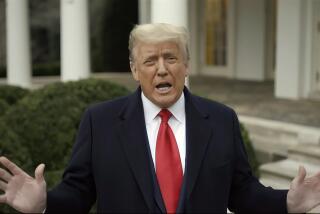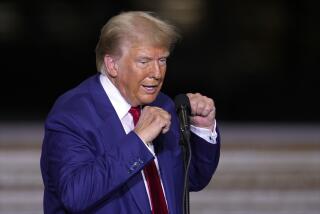McConnell moves to speed up Senate impeachment trial

- Share via
WASHINGTON — Senate Majority Leader Mitch McConnell proposed Monday to significantly speed up President Trump’s impeachment trial, offering rules that would shoehorn opening arguments into a grueling four-day period of 12-hour days, meaning a major part of the nation’s third-ever presidential impeachment trial could wrap up by the weekend.
A day before the trial starts in earnest, McConnell proposed rules that would give House prosecutors and the president’s lawyers up to 24 hours each — but a maximum of two days each — to present their arguments as to whether Trump should be removed from office.
Lawyers for the president, who initially sought a lengthy impeachment trial so he could mount a robust public defense, also signaled they were hoping to end the trial quickly, urging the Senate to “swiftly reject” the charges, calling them “deficient on their face” and an “affront to the Constitution.”
The lawyers submitted a 171-page legal brief to the Senate, their first major filing in the case, asserting that the two articles of impeachment approved by the House last month are unconstitutional and threaten to set a dangerous precedent by constraining future presidents in foreign affairs.
If the GOP-led body approves McConnell’s rules, senators would then get 16 hours to question each side by submitting questions in writing, and then four hours for closing arguments before beginning debate. At that point, the Senate would vote whether to subpoena witnesses and documents, including whether to accept the evidence the House collected during its three-month investigation.
If witnesses are allowed, they would first be deposed behind closed doors before the Senate decides if their testimony should be heard in public.
Debate and a vote on those rules is expected to be the first order of business Tuesday. The Senate could also vote to dismiss the charges, although McConnell has said he does not have the votes for that. Debate on the merits of the House case against Trump would not begin until 1 p.m. Wednesday and presumably could go past midnight.
McConnell (R-Ky.) has portrayed his rules as similar to those the Senate adopted during the 1999 impeachment trial of President Clinton. Though the total number of hours is similar, the two-day limits were not imposed. That trial lasted five weeks and ended in Clinton’s acquittal.
The proposed accelerated schedule infuriated Democrats, who saw it as a partisan effort to short-circuit a fair trial and to block Americans from following the historic proceedings.
“Sen. McConnell’s resolution stipulates that key facts be delivered in the wee hours of the night simply because he doesn’t want the American people to hear them. Any senator that votes for the McConnell resolution will be voting to hide information and evidence from the American people,” Senate Democratic leader Charles E. Schumer of New York said in a statement.
The president’s legal brief largely sidesteps evidence presented by the House in its brief to the Senate and rejects the abuse of power and obstruction of Congress charges as insufficient to warrant convicting Trump and making him the first U.S. president removed from office.
Declaring that Trump did “absolutely nothing wrong,” the president’s brief provides the most detailed look yet at the lines of defense Trump’s legal team intends to use once the trial commences. Claiming the evidence against Trump is “flimsy” and the impeachment case is “rigged,” it is a mix of legal arguments and tweet-ready slogans.
“All of this is a dangerous perversion of the Constitution that the Senate should swiftly and roundly condemn,” the lawyers, led by Trump’s personal attorney Jay Sekulow and White House Counsel Pat Cipollone, wrote. “The articles should be rejected and the president should immediately be acquitted.”
Instead of contesting the facts, Trump’s lawyers argued that the actions that prompted impeachment — the president’s withholding of $391 million in military aid to Ukraine and a coveted White House meeting in an effort to pressure the country’s leader into publicly opening an investigation into Joe Biden, a potential 2020 opponent, and into a debunked theory about the 2016 election — did not constitute a crime.
“The Impeachment Clause did not confer upon Congress a roving license to make up new standards of conduct for government officials and to permit removal from office merely on a conclusion that conduct was ‘bad’ if there was not an existing law that it violated,” the president’s brief argues.
Most constitutional scholars disagree with that argument, noting that impeachment trials of presidents and federal judges have never previously required indictable criminality. Impeachment is a non-criminal process that can lead to removal from office but not prison or a fine.
Trump’s lawyers counter that previous presidential impeachments all involved a specific crime, such as the perjury charge leveled against President Clinton in 1998.
Though Section 4 of Article Two of the Constitution says a president or vice president can be removed for “treason, bribery or other high crimes and misdemeanors,” most scholars say the broad language is meant as a catch-all for misconduct injurious to the state and society at large, not the violation of a criminal statute.
The dispute is hardly new. Indeed, the framers had an extended and well-documented debate on the question while writing the Constitution.
Last week, the Government Accountability Office, the investigative arm of Congress, issued a report concluding that the president violated a federal law called the Impoundment Control Act by blocking military aid to Ukraine that Congress already had approved.
The president “is not vested with the power to ignore or amend any such duly enacted law,” the GAO said.
But that report is an opinion, not an indictment or a legal document. It came out weeks after the House voted, and thus may not be allowed as evidence in the Senate trial, and the articles approved by the House in December don’t cite a specific violation of federal law.
In their brief, the president’s lawyers included several opinions from the Justice Department’s Office of Legal Counsel to back up its claims and support its position that it had not illegally defied Congress.
The president’s brief does not deny that Trump pressured Ukraine to investigate Biden and the 2016 election theory. But it says Trump’s actions were appropriate in the name of rooting out corruption — and that the president has the authority to conduct foreign policy as he sees fit.
With regard to obstruction of Congress, the president’s brief argues that he has the right to claim executive privilege over communications and documents used to inform foreign policy. It argues that he is within his rights to order witnesses to not testify, and to refuse to turn over documents, saying they are vital to maintaining the separation of powers under the Constitution.
“Treating a disagreement regarding constitutional limits on the House’s authority to compel documents or testimony as an impeachable offense would do permanent damage to the Constitution’s separation of powers and our structure of government,” the president’s lawyers wrote.
But the president never invoked executive privilege during the impeachment investigation, House investigators counter. Federal agencies and employees were simply told not to comply. Several State Department and Defense Department officials ignored the president’s demand and provided extensive testimony.
In a conference call arranged by the White House on Monday, a source working with the president’s legal team reiterated the argument that impeachment is invalid without an underlying crime. “To remove a president from office, an impeachable offense has to be a violation of established law,” the individual said, speaking to reporters on condition of anonymity.
“These articles of impeachment are deficient on their face,” the person said. “They could be dismissed right at the outset.”
Some Senate Republicans have discussed holding a vote at the outset of the trial to quickly dismiss the charges against Trump before either side presents its case. McConnell said last week that Republicans did not have the votes to dismiss the charges outright, and the idea has largely been dropped.
The seven House Democrats who will present the case for convicting and removing Trump from office — called House managers — continued their preparations for the trial Monday with a walk-through of the Senate chamber and workspace they will use in the weeks ahead. Trump’s lawyers soon followed, with both sides under instructions to keep the doors closed to onlookers and the news media.
The House managers filed their opening brief Saturday. It argued that Trump’s alleged attempt to involve a foreign power in a U.S. presidential election — in this case Ukraine and the 2020 race — is the exact reason the framers of the Constitution gave when they added impeachment as a drastic way to curb abuses by the executive.
Trump “used presidential powers to pressure a vulnerable foreign partner to interfere in our elections for his own benefit,” the managers said in a statement Monday. “In doing so, he jeopardized our national security and our democratic self-governance. He then used his presidential powers to orchestrate a cover-up unprecedented in the history of our republic: a complete and relentless blockade of the House’s constitutional power to investigate high crimes and misdemeanors.”
They have until noon Tuesday to rebut Trump’s Monday brief.
In a tweet Monday, Trump claimed — falsely — that Democrats did not try to call his aides as witnesses during the House inquiry that led to the impeachment vote on Dec. 18.
“They didn’t want John Bolton and others in the House,” Trump tweeted. “They were in too much of a rush. Now they want them all in the Senate. Not supposed to be that way!”
Bolton, Trump’s former national security advisor, refused to testify before the House, and Democrats chose not to pursue a subpoena and risk an extended struggle in court. Bolton has offered to testify in the Senate trial if he’s subpoenaed, but Trump has said he will claim executive privilege to try to block Bolton from appearing.
More to Read
Get the L.A. Times Politics newsletter
Deeply reported insights into legislation, politics and policy from Sacramento, Washington and beyond. In your inbox twice per week.
You may occasionally receive promotional content from the Los Angeles Times.











